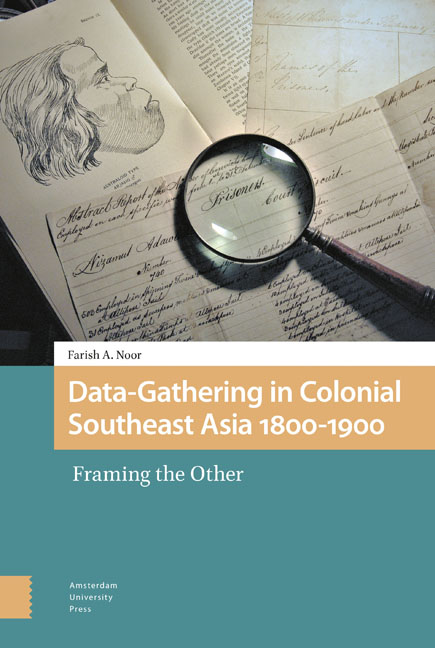Book contents
- Frontmatter
- Dedication
- Contents
- A Note on Spelling
- Introduction: The Panopticon in the Indies: Data-Gathering and the Power of Knowing
- 1 Caught in the Eye of Empire: Stamford Raffles’ 1814 Java Regulations
- 2 Deadly Testimonies: John Crawfurd’s Embassy to the Court of Ava and the Framing of the Burman
- 3 Fairy Tales and Nightmares: Identifying the ‘Good’ Asians and the ‘Bad’ Asians in the Writings of Low St. John
- 4 The Needle of Empire: The Mapping of the Malay in the works of Daly and Clifford
- 5 The Panopticon in the Indies: Data-collecting and the Building of the Colonial State in Southeast Asia
- Appendix A Proclamation of Lord Minto, Governor-General of British India, at Molenvliet, Java, 11 September 1811
- Appendix B Proclamation of Stamford Raffles, Lieutenant-General of Java, At Batavia, Java, 15 October 1813
- Appendix C The Treaty of Peace Concluded at Yandabo
- Appendix D The Treaty of Friendship and Commerce between Her Majesty and the Sultan of Borneo (Brunei). Signed, in the English and Malay Languages, 27 May 1847
- Appendix E The Racial Census employed in British Malaya from 1871 to 1931
- Timeline of Events and Developments in Southeast Asia 1800-1900
- Bibliography
- Index
1 - Caught in the Eye of Empire: Stamford Raffles’ 1814 Java Regulations
Published online by Cambridge University Press: 21 November 2020
- Frontmatter
- Dedication
- Contents
- A Note on Spelling
- Introduction: The Panopticon in the Indies: Data-Gathering and the Power of Knowing
- 1 Caught in the Eye of Empire: Stamford Raffles’ 1814 Java Regulations
- 2 Deadly Testimonies: John Crawfurd’s Embassy to the Court of Ava and the Framing of the Burman
- 3 Fairy Tales and Nightmares: Identifying the ‘Good’ Asians and the ‘Bad’ Asians in the Writings of Low St. John
- 4 The Needle of Empire: The Mapping of the Malay in the works of Daly and Clifford
- 5 The Panopticon in the Indies: Data-collecting and the Building of the Colonial State in Southeast Asia
- Appendix A Proclamation of Lord Minto, Governor-General of British India, at Molenvliet, Java, 11 September 1811
- Appendix B Proclamation of Stamford Raffles, Lieutenant-General of Java, At Batavia, Java, 15 October 1813
- Appendix C The Treaty of Peace Concluded at Yandabo
- Appendix D The Treaty of Friendship and Commerce between Her Majesty and the Sultan of Borneo (Brunei). Signed, in the English and Malay Languages, 27 May 1847
- Appendix E The Racial Census employed in British Malaya from 1871 to 1931
- Timeline of Events and Developments in Southeast Asia 1800-1900
- Bibliography
- Index
Summary
Unquestionably the British Empire was more productive of knowledge than any previous empire in history. […] The British may not have created the longest-lived empire in history, but it was certainly the most data-intensive.
Thomas Richards,The Imperial Archive (1993)An English government does not need the articles of a capitulation to impose those duties which are prompted by a sense of justice: Lord Minto's brand of benevolent imperialism in Java
Lawyer Thoyth: ‘You think that all who submit are evil? No. We are submitting to the way the world has become…’
Taboo (2017)Dir. Kristoffer NyholmThe British occupation of Java that began in 1811 and lasted until 1816 has been written about and discussed at length by several scholars (Carey, 1992; Hannigan, 2012; Noor, 2016.a); and there exist many accounts of how British power was exercised and projected across the island, culminating in the violent attack on the royal city of Jogjakarta and the killing of many of the inhabitants there. The first quarter of the 19th century was indeed a turbulent period in Southeast Asian history, for many political changes would take place, spurred on by wider geopolitical realities at the time. Back in England life was about as normal as it could be according to the new normal of the Regency period: In May 1812 Prime Minister Spencer Perceval was shot in the House of Parliament by the Liverpool merchant John Bellingham, while George IV busied himself with the latest trends in fashion and architecture. Britain's armies were caught up in the bloody wars on the continent while London dandies like Beau Brummell battled the fashion police on the home front. Tory Prime Ministers were being blown away, Catholics were spooking all and sundry, the Prince Regent's gout and dropsy would only get worse, but none of that would stop the East India Company – Willson's company of the Ledger and Sword (1903) – from doing its business abroad.
The Napoleonic Wars in Europe pitted Britain against its enemies on the continent as well as further afield, and in 1806 Rear-Admiral Sir Edward Pellew led a squadron of seven British warships on an attack against the Dutch in Batavia – dubbed by some as the First Java Campaign of 1806-1807.
- Type
- Chapter
- Information
- Data-Gathering in Colonial Southeast Asia 1800–1900Framing the Other, pp. 23 - 68Publisher: Amsterdam University PressPrint publication year: 2019



